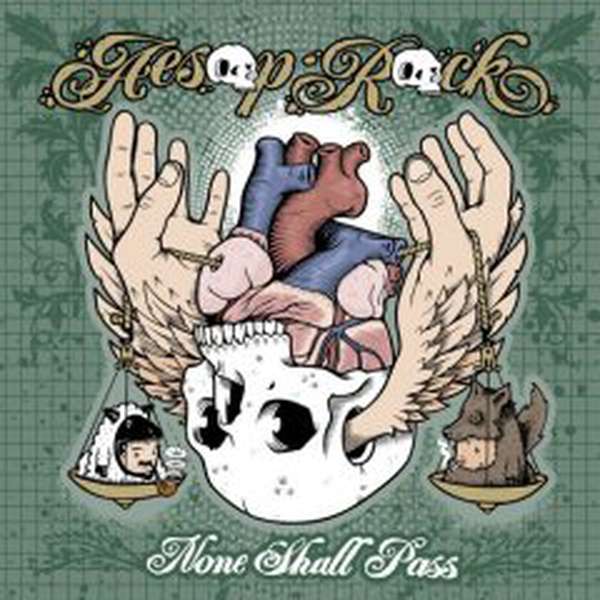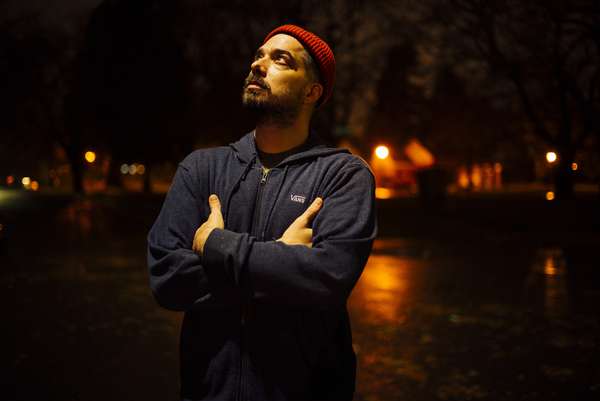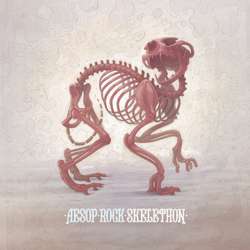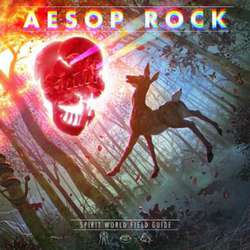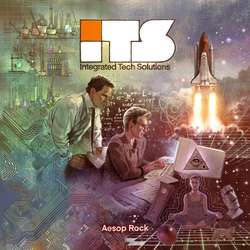Aesop Rock could be considered the resident Dadaist of the hip-hop community. Many consider him a hyper literate linguist (despite the fact he admits that he doesn't read much), blending modern pop culture phrasings with slang of the last ten years to create complex rhymes that actively reflective on the modern world. Others argue just the opposite; despite his ability to create a cultivating image, he says nothing at all, instead neatly arranging colorful language that lacks meaning. So which side of the fence does his fourth full-length, None Shall Pass, teeter on?
Lyrically, Aesop Rock, like any strong emcee, is a storyteller; it's his delivery of the tale that loses people. He doesn't rely on the basic linear format; he even eschews the less traditional cyclical style. He instead describes vivid images, detailing time, place and characters-the basic elements of a story- allowing the listener to decide what might happen given the circumstance. The manner of execution works better on this album than previous releases due to the content. One example is the song "Catacomb Kids," a reflection on growing up on Long Island. Anyone who had a knack for creating mischief as a pre-teen will surely identify with this song, filling in the story's gaps with their own experiences. Also the song marks something relatively new to Aesop Rock's style: introspection. Throughout his career the Long Island native has penned only few tracks aiming inward as opposed to the rest of his catalog, which details the world, especially New York, as he sees it. So does it work? Again this is where debate stems. While these tracks are more linear in narration than much of his previous work it's still up to the listener to create meaning. And while it's true that not every line may contain meaning, he's far from the first artist to commit such a crime. And for those whose minds still work within the box, you will have to think a little harder to appreciate this album. My favorite example is from the song "Citronella," which I believe addresses the public's need for security, which may lead to ridiculous extremes. Aesop Rock writes, "Nothing says charm like an armored car full of the clone-farm tards making they way to the arms bazaar." While Aesop Rock may be inching closer to being understood, he still manages to stay a long way from being figured out.
In the production department, this could be Aesop Rock's most accessible record to date. Several songs on the album seem worthy of radio play and would sound good being pumped from the speakers of a club or your personal car stereo system. Most of the tracks are created by longtime friend, Blockhead who produced most of Aesop Rock's most acclaimed album, Labor Days. These songs still carry that trademark gloom Blockhead is known for but with a stronger groove, suggesting that doom may be impending, but there's no reason we can't party. Aesop Rock produces a few of his own tracks, which feature a lot of live instrumentation, still uncommon in hip-hop. For a good example check out "The Harbor is Yours," a tale about pirates which has a downright funky bass line, probably played by Aesop himself. Rob Sonic and Definitive Jux CEO, El-P, also offer a cut each. Another notable feature is the abundance of turn table work on this album, something that was a staple in it's beginnings but is now lacking in much of today's rap music. All but one of the tracks on None Shall Pass features DJ Big Wiz.
While this may not be Aesop Rock's best work to date, it still shows his ability to push the genre of hip-hop to new levels both lyrically and musically, proving himself as a permanent fixture in the world of underground rap, even if no one knows exactly what the hell he's talking about.
